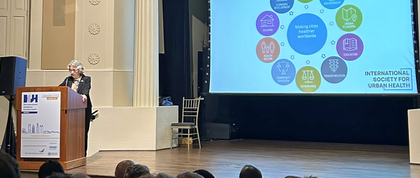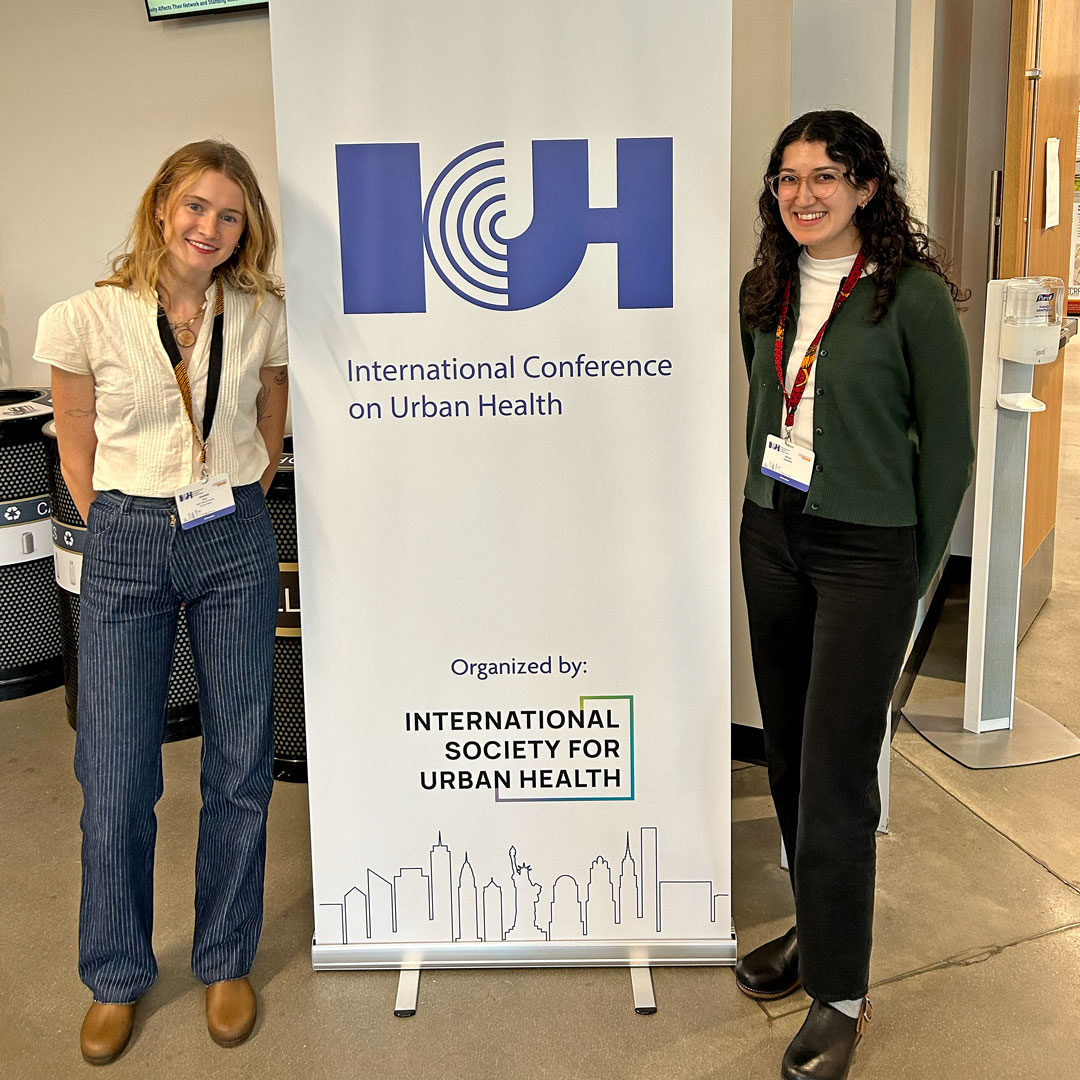
A blog by 2023-2024 Climate Fellows Liz Carr and Marisa Guerrero
As William N. Rom Climate Change and Health Fellows, we spent the first week of November attending the 19th Annual International Conference on Urban Health (ICUH), attended by over 300 urban health professionals from around the world and hosted in Atlanta, Georgia. The conference theme was Turning Evidence into Impact: Urban Health as a Global Driver of Equity and Social Justice. Across four days and dozens of sessions, we explored the themes of evidence, impact, equity and justice, and the urban/global health connection – all through the lens of climate change and public health.

A foundational element of ICUH was a commitment to research-driven, evidence-based interventions to improve the health of urban populations. Through poster and oral presentations, we learned about health research being done worldwide. A few highlights include: the potential benefits to children's health of anti-eviction public policy; how Melbourne's Urban Forest Strategy and Transportation Strategy align to advance public health; and the use of geo-spatial technologies in informal settlements in Nairobi, Kenya.
In addition to featuring innovative public health research, speakers across plenaries and breakout sessions highlighted two main themes: community leadership and intersectoral collaboration. One workshop, Beyond Prescriptions and Services: Leveraging 'With' and 'By' Strategies for Healthier Living Presentation type: Workshop, framed community leadership as a shift away from providing help to and working for communities and towards solutions developed with and by communities themselves. That "with/by" framework was a throughline across many of the sessions, which highlighted the importance of community leadership in research, economic development, and decision-making. In another notable plenary session titled Reclaiming Your Community, You Don't Have to Move out of Your Neighborhood to Live in a Better One, urban revitalization strategist and environmental justice advocate Majora Carter explored her vision and work towards transformational, community-led real estate and economic development.
Furthermore, many of the sessions highlighted the intersectionality of the field of urban health and how effective solutions must span across multiple sectors and professions. The conference speakers and attendees represented an array of disciplines. We sat alongside urban planners, academic researchers, government officials, news reporters, advocates, fellow graduate students, urban farmers, and more from over 50 countries. There was such a variety of professional pathways represented within the urban health profession, and it is inspiring to see the range of sectors come together grounded by shared health equity objectives. Nathaniel Smith, Founder and Chief Equity Officer/CEO of Partnership for Southern Equity, summarized this collaborative urban health approach in the plenary session One Life, One Planet, One Society – Leveraging One Health and Climate Action in Cities, stating: "We cannot find a siloed solution to a complex, intersectional problem."
Equity and Social Justice in Urban Health: Equity and justice were central conference themes. The research presented, and the methods to achieve impact were guided by a commitment to addressing health disparities and shaping equitable public health solutions. The opening plenary session posed the question, "Why do we cure the conditions and then send people back into the systems that make them sick?" This question framed our experience of the conference and the structural and systemic inequalities at the root of the urban health inequities explored throughout the week. Equitable solutions must be transformational – addressing systems and their roots.
Climate Change and Urban Health: Though climate change is such a far-reaching public health crisis, it came up in nearly every session we attended as a focal point. As climate change and urban health intersect in regard to health equity, various sessions emphasized that historically marginalized communities are often on the frontlines of climate and environmental impacts. For example, the breakout session titled IResearch Club: An Indigenous Approach to Environmental Health Research Experiences explored community-led research that demonstrates that American Indian populations in Nebraska disproportionately experience urban heat islands – an extreme heat phenomenon intensified by a warming global climate – and associated health impacts.
Nathaniel Smith of Partnership for Southern Equity indicated how the climate and environmental health inequities are another symptom of systemic inequalities and structural racism. "Think about how our planet and natural resources have been extracted and abused, and think about the way we treat our people," he explained in arguing that how we treat people and the environment are two sides of the same coin. Intersectoral solutions were a theme for climate and health throughout the week. Sessions highlighted solutions across sectors, from infrastructure to public policy to children's well-being, to create sustainable, resilient cities and spaces where generations of people can thrive.